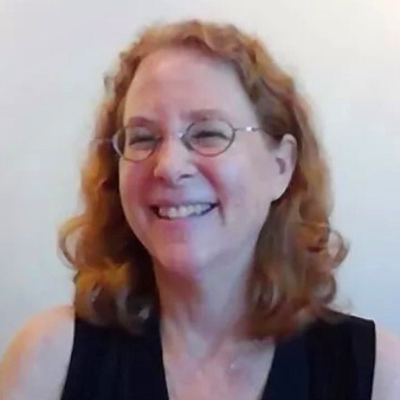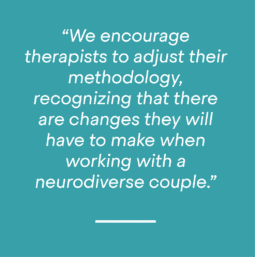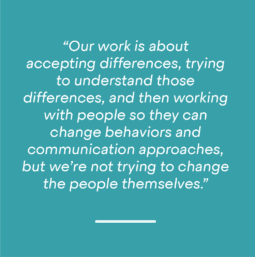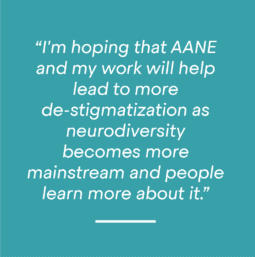News
Meet the Trainer: Grace Myhill

Grace Myhill, MSW, a BUSSW alum and groundbreaking leader in neurodiverse couples therapy, is currently the director of Couples and Partner’s Services and the director of the Peter M. Friedman Neurodiverse Couples Institute at the Asperger/Autism Network (AANE). After becoming aware of a lack of training for professional clinicians working with neurodiverse couples, she created a bevy of skill-building tools and lessons for therapists to better serve these clients.
Grace developed two courses on Neurodiverse Couples Therapy for AANE. These courses are currently offered at a 35% discount on The Network’s Learning Catalog. We spoke with Grace about her experience building the first online training program and community for neurodiverse couples therapists.
Could you tell us more about the two courses that you’re offering on the Network’s Learning Catalog?
Neurodiverse couples are everywhere, and often times therapists don’t know they are actually working with a couple in which one or both people are neurodivergent. The first course, Training 101: Fundamentals of Working with Neurodiverse Couples in Therapy, teaches therapists how to recognize, understand, and work with neurodiverse couples effectively in therapy. It also provides specific tools and strategies that help couples communicate with each other and connect. A case study and several first person interviews and stories from neurodiverse couples bring an authentic perspective to the course. Participants can see and hear from a number of the therapists who specialize in working with neurodiverse couples as well as the real experts, those with lived experiences.

In the second course, Certification 201: Case Presentations and Advanced Topics in Neurodiverse Couples Therapy, therapists really get to apply what they’ve learned in Training 101 to their specific clients. Participants bring up questions and we discuss how to adjust their approach when working with neurodiverse couples. We encourage therapists to adjust their methodology, recognizing that there are changes they will have to make when working with a neurodiverse couple.
Your training and a lot of your work focuses on neurology. How does that differ from other work in this field that focuses on neurodiverse couples?
There is a lot of other work in the field of neurodiverse couples therapy. We are the first to create a training of this kind. When we say the courses focus on neurology, what we mean is that we look at the couple’s dynamics through a neurological lens. That’s another selling point for therapists to take our course and then they are listed on our website for neurodiverse couples to find them. This really is a much needed resource that isn’t out there.
Do you see this model being adapted or benefitting other fields?
We started the work on our course with a survey of neurodiverse couples and now we have over 700 respondents. An overwhelming number of participants said that when they worked with therapists who are not trained to work with neurodiverse couples, the therapy was not only unhelpful, but for many it was harmful. I think that that’s something that all therapists should be aware of.
As a pioneer in this area, you and AANE have developed a community of social workers, therapists, and clients. What types of change are you seeing coming from this convening of stakeholders?

There are strengths and challenges to all neurologies. Neurodiversity is a natural part of the human experience. Our work is about accepting differences, trying to understand those differences, and then working with people so they can change behaviors and communication approaches, but we’re not trying to change the people themselves. I think that’s something both the professional community, the families, and the people on the spectrum really get from AANE’s community.
In terms of the community we developed for therapists, it’s wonderful to have an online community where they can reach out to one another. They all started from the same baseline of understanding because they’ve all taken this training. The community is very supportive of each other, too. It’s a place to share resources, a place to learn more, and a place to share the difficulty of this work sometimes.
Why did you choose the Trainers Hub? How do you see potential participants coming through this platform and then fitting into the community you already have established?
This is a whole new area for a lot of therapists, and getting this information out to this new database that BUSSW has is really helpful for us. I think The Network at BUSSW has a very good reputation and a lot of therapists will seek out their courses because they know this is going to be good quality. As a graduate of BUSSW, it’s really been an honor to be a part of their offerings.
Have you seen any change in terms of how care for neurodiverse people might be improving or changing, particularly for Black or Brown people?

I think the overwhelming demographic of our therapists who have taken the training are white and most are neurotypical women. We do have some male therapists and also some male and female therapists who are on the spectrum, and some people of color, but we would love to have more. We sometimes get requests from a client for a therapist of a particular demographic, particularly if their community stigmatizes engaging in therapy. I’m hoping that AANE and my work will help lead to more de-stigmatization as neurodiversity becomes more mainstream and people learn more about it.
How do you see this work growing in the future?
I’ve been doing online groups well before the pandemic, and well before it became popular, because there just aren’t enough professionals in most areas.. We’re lucky that some of the therapists doing this work have multiple state licenses because there are still large areas across the United States where we have nobody with this training. I get so excited every time we offer a Training 101 class and there’s someone there who is the first person in their state or country that we can then refer to. Our goal is to keep expanding the number of trained professionals on the AANE website map. We have close to 100 therapists all across the U.S. as well as in England, Poland, India, and Australia.